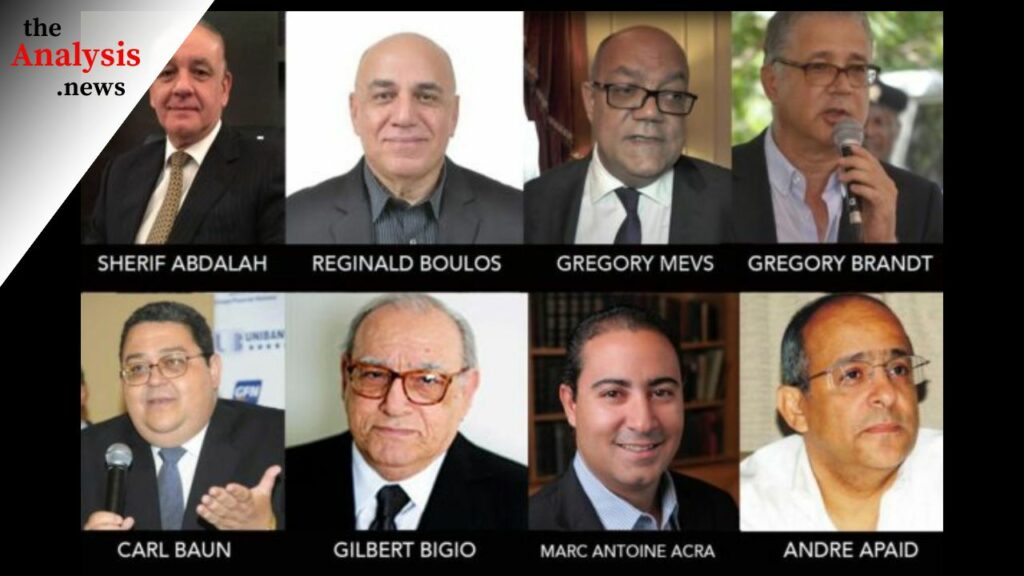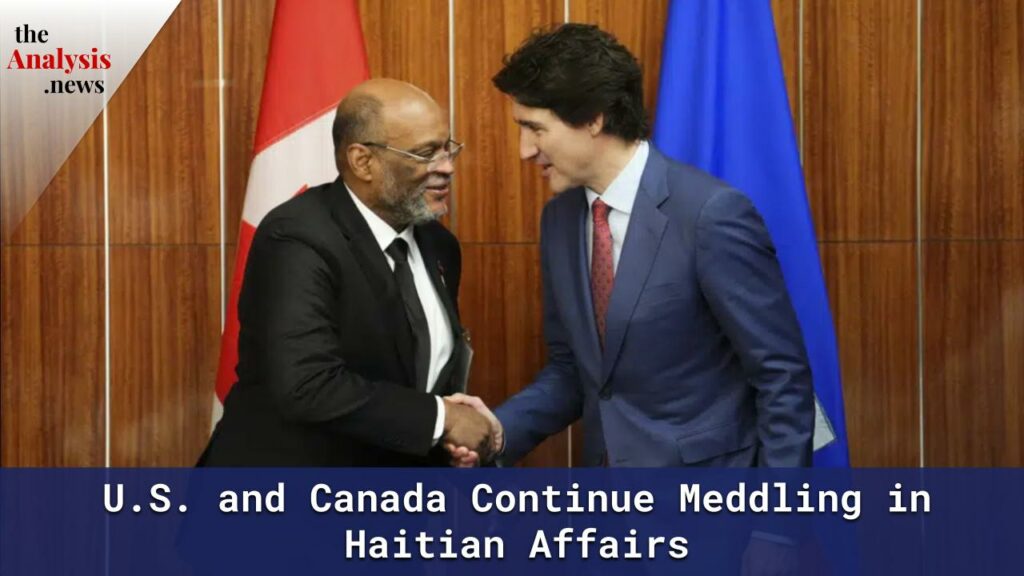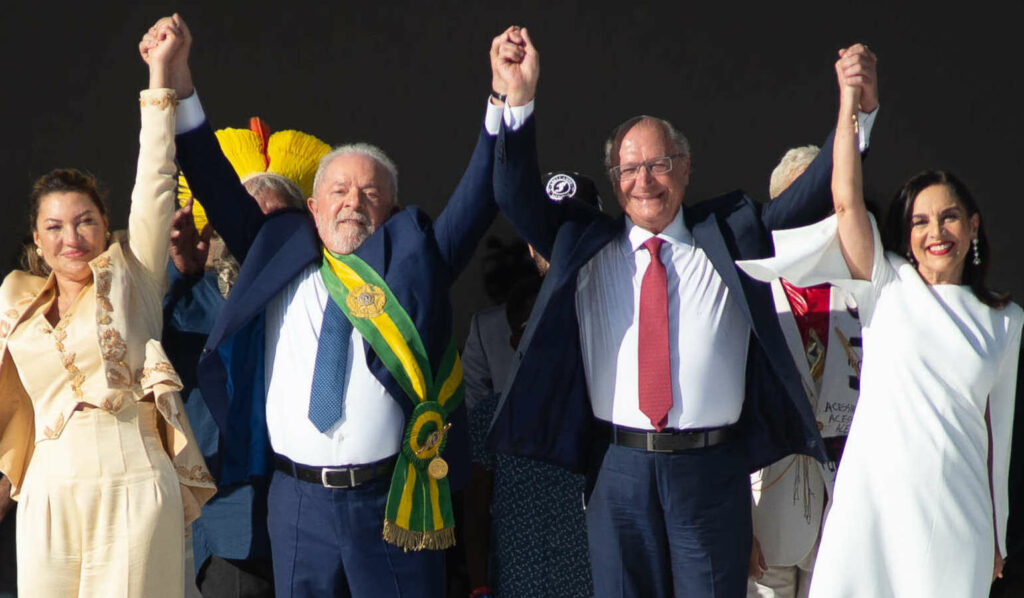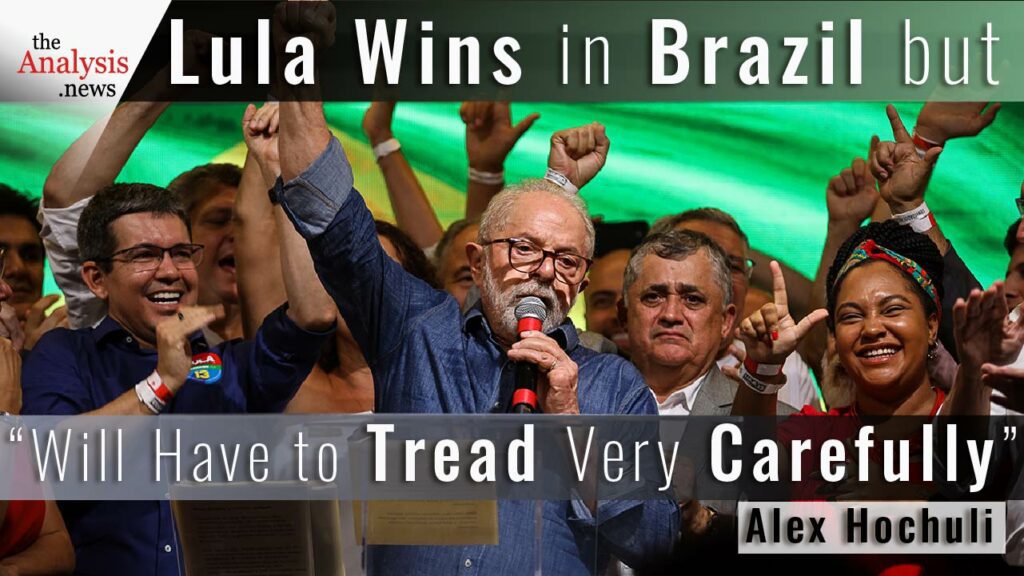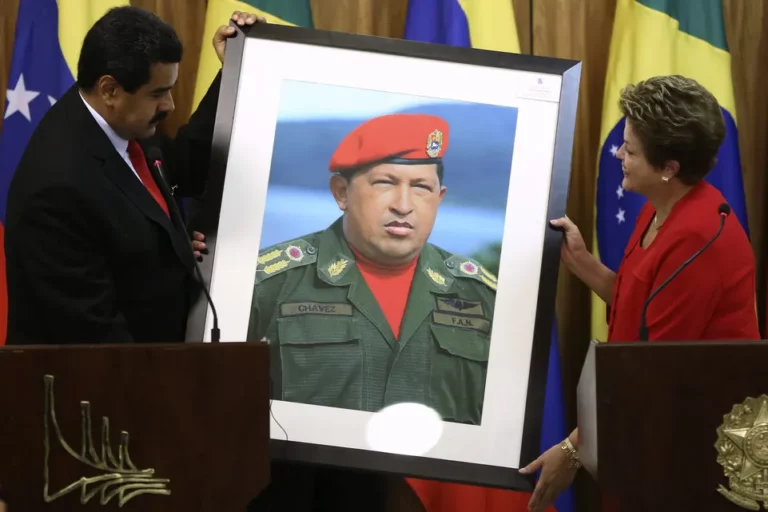Argentina elected Javier Milei, a right-wing libertarian populist, as its president on November 19th. Milei won because he represented a clear alternative to Argentina’s untenable economic crisis, says political scientist Atilio Borón. While he will no doubt inflict more pain on Argentina, his ability to privatize everything, though, is not assured because he lacks a majority in Argentina’s legislature.
Gregory Wilpert
Welcome to The World on Fire. I’m your host, Greg Wilpert. Argentina experienced a political earthquake on November 19, when the right-wing TV commentator and libertarian economist Javier Milei won Argentina’s presidency with 56% of the vote. Milei could be considered a populist in the mold of Brazil’s Jaír Bolsonaro or the US’s own Donald Trump. He has promised to privatize practically all government services and to dollarize the economy, among many other things.
Joining me now from Buenos Aires to make sense of what happened in Argentina on Sunday, November 19, is Atilio Borón. He’s an Argentine social scientist and the author of numerous books on neoliberalism, imperialism, and geopolitics. He’s also Professor Emeritus of Political Science at the University of Buenos Aires. Thanks for joining me today, Atilio.
Atilio Borón
It’s a pleasure to be with you here.
Gregory Wilpert
Argentina has historically gone back and forth between a right-wing, neoliberal paradigm and then also a more progressive or center-left paradigm representing basically the former President of Argentina, Juan Perón. Currently, the election of Javier Milei seems to have represented a definitive break from the dominance of these Peronist parties. Now, how did that happen? Why did so many Argentines vote for someone so extreme who seems crazy both in terms of his political proposals and also in terms of his personality?
Atilio Borón
Well, I think that one crucial factor in understanding this situation is the poor economic performance of the present government, Alberto Fernández, which failed to control inflation. At this moment, at the end of the year, the estimation is about a 190% inflation rate for the whole of 2023 and a very sharp decrease in wages and salaries of most of the population. People really wanted a change. Mr. [Sergio] Massa, who did a very good political campaign, was not able to convince a large part of the electorate. He promised that he would stop inflation and recreate a more stable economic environment, but it was not believed by the people for a very simple reason. He is, and still is today, the Minister of Economy. Many people said, “Okay, if you know how to do it, do it now. Don’t wait until you are elected president, and then we will see what happens. Do it now.”
To some extent, Massa was seen as the continuation of the present government. And he was, in fact, a continuation with some new features because he is not really a Peronista. On the other hand, most of the population wanted a change, no matter what the change meant. They wanted something to be changed.
I want to make this clear because there is a mistaken analysis that says that 56% of the Argentinian population went fascist. This is not true. Most of the people who voted, I would say the overwhelming majority of the people who voted for Milei wanted to keep inflation low, increase their wages, and increase citizen security in the slums and in the poor neighborhoods of the greater Buenos Aires area, and that’s all. They have nothing to do with this fancy idea, crazy idea.
Milei revived some of the saints of Adolf Hitler. When Hitler talked about the superiority in terms of the white race, Milei said that we are esthetically superior to the left-wingers, the collectivists, the communists, Marxists, and feminists. He has a lot of people who are absolutely the worst thing that happened in Argentina. People didn’t vote for that; they just wanted a change. Massa did not offer a likely change in the coming situation. Milei has all this gesticulation and this strong face. He was the angry man who went with a chainsaw to demolish the central bank and to fire all the hundreds of thousands of people working in the state who were not working at all, according to him. And, of course, people voted for him, that’s all. But his ideas are absolutely impossible to carry out in practice. There is no question about that.
Gregory Wilpert
Now, who is Javier Milei, and what can we expect from him? As you mentioned, a number of his policies seem very extreme. He says of himself that he’s a libertarian. How many of his far-right ideas, libertarian ideas, do you think he will be able to implement? What do you think will happen?
Atilio Borón
He wants to demolish, to explode the central bank. We would be the first country except for Monaco and a few islands in the Pacific without a central bank. But of course, Monaco is not, in practical terms, part of the French economy; they use the euro. That cannot be done. Secondly, he said that the major goal of his policies will be to achieve fiscal equilibrium and the state will not spend one penny more than the budget, which is likely to be raised with taxes and so on. This is impossible. Most of the country runs on the basis of fiscal deficit. Keynes made all these elaborations about the virtues of fiscal deficit to promote economic development. He said no fiscal deficit, zero deficit. For instance, in order to do that, he said that he would not pay the Aguinaldo, as we say it. I don’t know this word.
Gregory Wilpert
End-of-year bonuses.
Atilio Borón
End-of-year bonuses have been a historical conquest of the laboring classes in Argentina since the late ’40s. Can you imagine? This is part of the basic compensation for the salaries and wages which are going down the drain. He said, “I will not pay that.” Well, that is ridiculous because this will create an enormous social explosion. At the same time, he says, “There is no money in the state. And, of course, all the public works that are already in execution, which are unfinished, will be stopped.” When people say, “Well, we need a state sewage system, we need fresh water, and we need the pipes to run. That’s a major problem. The [foreign language 00:08:13], as we call it in Argentina, the local authorities, they will have to talk to the private guys who are in their locality and see who is interested in doing business with all the sewage and freshwater pipelines. These are the ridiculous ideas that make no sense.
I must tell you, Greg, that he has zero experience. Zero! Not only as a public administrator but also as an entrepreneur. Here is a guy, and the only thing he has done has been writing books with a lot of plagiarism, by the way, the nonsense of plagiarism in the books. He has no idea about the prices. If you ask him how much is one kilo of meat today in Argentina? He has no idea. What is the value of one liter of milk? No idea. When the journalists ask him how he is planning to run the country, he doesn’t know basic things.
For instance, the transportation ticket in urban Buenos Aires, he has no idea. And he said, no, because all the shopping is done by my sister. He’s single and lives with his sister.
I have an idea. What he has in his head is an Excel sheet, a worksheet, and looking at that, he thinks, well, we need a fiscal equilibrium. We will stop spending money on science and technology. No more free university. We are going to privatize the public university. We have 57 public universities in Argentina. He wants to privatize all of them or introduce a fee that cannot be paid by Argentinians. We have 50% of the population living under the poverty line. There are people who are among the poor and because of this great development of local universities, are attending the university because the universities are free. If you impose a fee to register at one of those public universities, most of those people won’t be able to pay.
The idea he has is if you have a problem with your salary, you can always sell one of your limbs. You have two, okay? Your kidneys, you have two kidneys; just sell one. He also argued that organ trafficking is a market and should not be interfered with by the state. If somebody decides to sell a limb, he should be able to, and the state has nothing to do with that. That’s a crazy idea. And, of course, I see that this is very, very difficult to carry out in practice.
Gregory Wilpert
Why do you think that’s so difficult? In terms of practice, of course, there are obstacles in terms of the population accepting it and just whether it works. What’s the political situation in Congress? Will he have any support? What kind of support will he enjoy there?
Atilio Borón
Well, he doesn’t have a single governor in a country in which governors are very, very strong. He doesn’t have a single mayor in all the countries. In Congress, his bloc is a minority. The traditional right, led by Mr. Mauricio Macri, could support a few of those decisions. But it will be very, very difficult to get the support, for instance, for the abolition of the central bank, among other things, because that would imply a constitutional reform in which you need to have two-thirds of the members of Congress supporting the decision. That would be very blah, blah, blah. He talks about all those things and makes gestures, but in real terms, it will be very difficult.
A few of those decisions will be carried out. For instance, I am very much afraid about the privatization of the pension funds, which in Argentina is a very significant part of the national income. Why do I say this? Because the population over 65 or 70 years old, 70 if you are male, 65 if you are women, 93% of that population today is assisted with a pension or [foreign language 00:13:27], as we say here in Argentina.
This is a huge business and very profitable business. It doesn’t work because look at the Chilean experience. The Chilean experience shows that it has been a real failure. Most of the problems that erupted in October 2018 in Chile were due to the fact that people started to go to the pension fund and then received only one fraction of what they expected. There are documents from the World Bank saying that the system is not working as it should and that the state pension funds are better and more reliable than private.
There are enormous interest groups surrounding Mr. Macri, who is the real mastermind behind all of this while using the figure of Milei. Macri wants some of these big changes in the Argentine economy. For instance, the pension system, or the state oil company, is very profitable these days because of the new discoveries of oil and gas reserves in the Argentine South. I think that some changes will take place not without very strong popular resistance because people really have a sense that we have already tried this medicine in the past, in the years of [Carlos] Menem. We know what happened with the privatization of the state oil company in which there was a question of robbing all our assets and not making any real investments. When the company recovered by the state and made more investments, they discovered this huge Vaca Muerta oil field. That means it would be against the current public opinion to try to go back to a privatization scheme once again.
Gregory Wilpert
Now, it seems like the Argentines had a very difficult choice between Milei and Massa. One person represents this right-wing libertarianism, and the other one represents an economic failure, essentially. How did it come to that? What happened to other forces, in particular, progressive forces, let’s say, why weren’t they able to present a coherent alternative?
Atilio Borón
Well, it was very, very difficult. When you have the threat of an extreme right like Mr. Milei, then people try to rally around someone who presents a more or less palatable alternative. Even if I didn’t like the policies of Mr. Massa, and I think that he did not do the job we needed him to do in order to keep inflation low, when you have to decide between him and Milei, there is no choice.
In one of my articles, I used a letter written by Trotsky regarding the election of 1933 in Germany, in which he asked the communists and the socialists to support Mr. [Heinrich] Brüning because he said, “We have the absolute evil, which is Hitler. On the other hand, we have a bourgeois politician, but at least he will not shoot us and kill all of us. Now we have to prevent Hitler from winning the election.” This is the same reasoning that went on and on in Argentina among many people who were very progressive. We are very angry with this government. Look, even if the other guy resembles Hitler, he will not do what he says he wants to do. For instance, many people say he’s talking about that, but he’s not doing that. They did not believe that Milei was serious. Milei is a fanatic. He’s absolutely fanatic.
Do you know the story of the dogs? He has four dogs. All the dogs have the name of some Libertarian. The most famous is Murray, which is the name of one of the dogs. I wrote a paper, a small article, that was published today. Not a single conservative government ever applied the ideas of libertarianism in America or in the United States. Not even Reagan, not Trump, not Margaret Thatcher, no one. Those are fancy ideas for a scholarly discussion. Greg, did you know that in academia, many times we are involved in very different discussions, like the sex of angels. In Spanish we say sexo de los angeles. It’s nonsense.
Who believes that markets can properly work without some state regulation? That markets alone, absolutely alone, because Milei repeats this word by word, Rothbard. Rothbard said that the state is an organization that robs the taxpayers, and Milei says exactly the same thing. Yesterday evening, he said, “If your salary, if your wage is too small, it’s because you have too much estate.” Therefore, those in front of that dilemma, people said the people who were in a very bad situation didn’t care too much about what Massa was saying because Massa should have solved the inflation problem before, not promised that he would resolve the problem of inflation when he was president. That is the heart of the matter.
We are entering into a dangerous zone during the next three months. I’ve seen that Macri, who wrote a book called Primer Tiempo, which I read very thoroughly, he said in the last chapters that we have to try again what we did, but it didn’t come out well because we were very slow. Gradualism is fatal to a process of change.
Now, my fears are that Milei may make an agreement with the representatives in the Chamber of Deputies of Juntos por el Cambio, which is this organization created by Mr. Macri, and approve two or three general laws, two or three general pieces of legislation. On the basis of those legislations and advance in dismounting, for instance, the labor legislation, the union legislation, social rights, minorities, and all that. This is my fear.
In the first three months, many people will say, “Well, let Milei rule the country to see what he wants to do.” I think those next three months: December, January, and February; will be absolutely critical because he may get approved for some legislation, which will be very favorable for him to introduce major reforms in the organization of the state, in the deregulation of the economy, in the liberalization of the foreign trade, which produced a huge amount among the small and medium enterprises, which are the most important sources of labor demand in this country.
Gregory Wilpert
Now, I want to turn to what a Milei presidency would mean for the region and what it might mean for Latin America’s relationship with the United States. What do you think? How is that going to develop?
Atilio Borón
Well, as I mentioned to you, he’s a person with very strong convictions. He’s a fanatic. He’s a true believer, the classic true believer. He studied American political science. He will reduce the contacts. This is what he boasted about. He said he would not deal with communist regimes. China is one communist regime. Brazil is also, to him, a communist regime. Lula is a communist leader.
You have to bear in mind that for Milei and the small sector of fanatics that surround Milei, any form of collectivism is communist. Any kind of Keynesian politics is collectivist. He is a fanatic leader of The Road to Serfdom, the book by [Friedrich] von Hayek. Remember that book was dedicated to the collectivist of all parties. Well, he believed it. He will try to reduce the relationships between China and Brazil. He said that the first visit of the president will be to Israel. He plans to move the embassy from Tel Aviv to Jerusalem. He is a real enemy of the Chinese. For that reason, Milei is celestial music to Washington bureaucrats, i.e., Blinken, Biden, and everyone else, because he’s a cold warrior against China.
My question is, will he be able to go ahead with that anti-China program when China and Brazil are the first and second commercial partners in Argentina? What will be the reaction of the entrepreneurial leaders, the big corporations that have been supporting Milei? Not to break the ties with China but to increase their business with China, which is one of the largest markets for Argentine products. It is the same with Brazil. Argentina and Brazil’s economies are very, very strongly intertwined. Therefore, I think that he will try to do that.
Summing up the answer to your question, this will imply a weakening of the capacity of Latin America and the Caribbean to play a role in the international chessboard, as Brazil used to say. Brazil needed to have Argentina side by side in order to make better negotiations with the great powers of the West and also with China, Russia, and India. Now, Lula is alone.
I am concerned because Argentina was accepted as a member of the BRICS which is a very important achievement of this government. It is very likely that Mr. Milei will decide not to accept the invitation and slam the door while going out of the brief, which will be a major, or, I would say, a catastrophic mistake in terms of foreign policy.
In addition, the people who are advising him in foreign policy, Greg, are students of International Relations 100, and all of them will be flanked in examination because they don’t understand absolutely anything of what happens in the world. Absolutely nothing. We are extremely concerned, you can say, given all my worries about the situation.
Gregory Wilpert
Well, we’ll definitely continue to follow the situation and hopefully have you back again. We’ll leave it there for now. I was speaking to Professor Atilio Boron, Professor Emeritus of Political Science at the University of Buenos Aires. Thanks again, Atilio, for having joined me today.
Atilio Borón
Thank you, Greg. I’m sorry I was giving such a grim picture of the Argentine situation, but I hope that perhaps in a few months, we can have a more enjoyable conversation. Thank you very much.
Gregory Wilpert
Thank you to our audience for joining us on The World on Fire. Until next time.
Podcast: Play in new window | Download | Embed
Subscribe Apple Podcasts | Spotify | Android | iHeartRadio | Blubrry | TuneIn | Deezer | RSS
Never miss another story
Subscribe to theAnalysis.news – Newsletter
Atilio Borón is an Argentine Marxist sociologist. He worked as a Professor of Political Science at the Latin American Social Sciences Institute and at the University of Buenos Aires. He also served as Secretary General of CLACSO, an academic umbrella body for Latin America.



